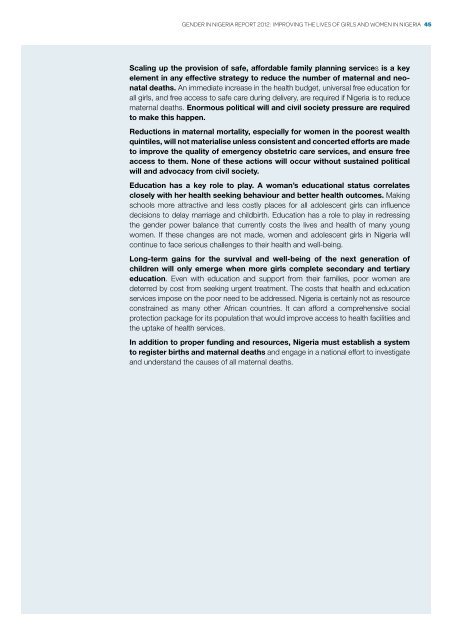Gender in niGeria report 2012 - Economic Commission for Africa
Gender in niGeria report 2012 - Economic Commission for Africa
Gender in niGeria report 2012 - Economic Commission for Africa
You also want an ePaper? Increase the reach of your titles
YUMPU automatically turns print PDFs into web optimized ePapers that Google loves.
<strong>Gender</strong> <strong>in</strong> Nigeria Report <strong>2012</strong>: Improv<strong>in</strong>g the Lives of Girls and Women <strong>in</strong> Nigeria 45<br />
Scal<strong>in</strong>g up the provision of safe, af<strong>for</strong>dable family plann<strong>in</strong>g services is a key<br />
element <strong>in</strong> any effective strategy to reduce the number of maternal and neonatal<br />
deaths. An immediate <strong>in</strong>crease <strong>in</strong> the health budget, universal free education <strong>for</strong><br />
all girls, and free access to safe care dur<strong>in</strong>g delivery, are required if Nigeria is to reduce<br />
maternal deaths. Enormous political will and civil society pressure are required<br />
to make this happen.<br />
Reductions <strong>in</strong> maternal mortality, especially <strong>for</strong> women <strong>in</strong> the poorest wealth<br />
qu<strong>in</strong>tiles, will not materialise unless consistent and concerted ef<strong>for</strong>ts are made<br />
to improve the quality of emergency obstetric care services, and ensure free<br />
access to them. None of these actions will occur without susta<strong>in</strong>ed political<br />
will and advocacy from civil society.<br />
Education has a key role to play. A woman’s educational status correlates<br />
closely with her health seek<strong>in</strong>g behaviour and better health outcomes. Mak<strong>in</strong>g<br />
schools more attractive and less costly places <strong>for</strong> all adolescent girls can <strong>in</strong>fluence<br />
decisions to delay marriage and childbirth. Education has a role to play <strong>in</strong> redress<strong>in</strong>g<br />
the gender power balance that currently costs the lives and health of many young<br />
women. If these changes are not made, women and adolescent girls <strong>in</strong> Nigeria will<br />
cont<strong>in</strong>ue to face serious challenges to their health and well-be<strong>in</strong>g.<br />
Long-term ga<strong>in</strong>s <strong>for</strong> the survival and well-be<strong>in</strong>g of the next generation of<br />
children will only emerge when more girls complete secondary and tertiary<br />
education. Even with education and support from their families, poor women are<br />
deterred by cost from seek<strong>in</strong>g urgent treatment. The costs that health and education<br />
services impose on the poor need to be addressed. Nigeria is certa<strong>in</strong>ly not as resource<br />
constra<strong>in</strong>ed as many other <strong>Africa</strong>n countries. It can af<strong>for</strong>d a comprehensive social<br />
protection package <strong>for</strong> its population that would improve access to health facilities and<br />
the uptake of health services.<br />
In addition to proper fund<strong>in</strong>g and resources, Nigeria must establish a system<br />
to register births and maternal deaths and engage <strong>in</strong> a national ef<strong>for</strong>t to <strong>in</strong>vestigate<br />
and understand the causes of all maternal deaths.

















